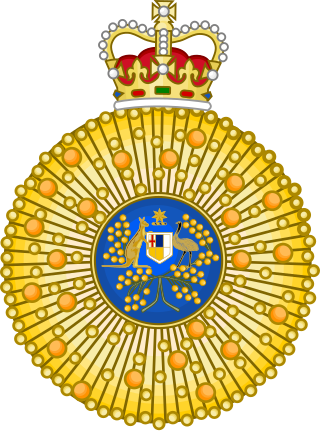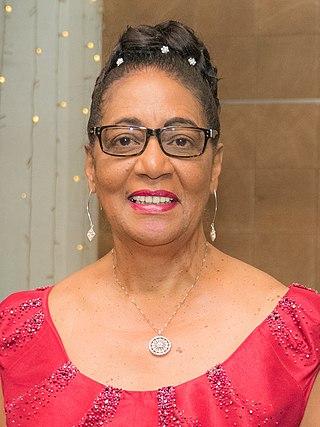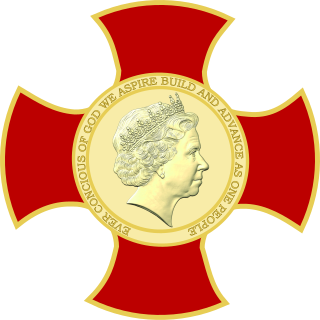In the United Kingdom and the British Overseas Territories, personal bravery, achievement, or service are rewarded with honours. The honours system consists of three types of award:

The Order of Australia is an honour that recognises Australian citizens and other persons for outstanding achievement and service. It was established on 14 February 1975 by Elizabeth II, Queen of Australia, on the advice of the Australian Government. Before the establishment of the order, Australian citizens received British honours.

The Most Excellent Order of the British Empire is a British order of chivalry, rewarding contributions to the arts and sciences, work with charitable and welfare organizations, and public service outside the civil service. It was established on 4 June 1917 by King George V and comprises five classes across both civil and military divisions, the most senior two of which make the recipient either a knight if male or dame if female. There is also the related British Empire Medal, whose recipients are affiliated with, but not members of, the order.
Sir is a formal honorific address in English for men, derived from Sire in the High Middle Ages. Both are derived from the old French "Sieur" (Lord), brought to England by the French-speaking Normans, and which now exist in French only as part of "Monsieur", with the equivalent "My Lord" in English. Traditionally, as governed by law and custom, Sir is used for men who are knights and belong to certain orders of chivalry, as well as later applied to baronets and other offices. As the female equivalent for knighthood is damehood, the suo jure female equivalent term is typically Dame. The wife of a knight or baronet tends to be addressed as Lady, although a few exceptions and interchanges of these uses exist.

The Most Honourable Order of the Bath is a British order of chivalry founded by King George I on 18 May 1725. The name derives from an elaborate medieval ceremony for preparing a candidate to receive his knighthood, of which ritual bathing was an element. While not all knights went through such an elaborate ceremony, knights so created were known as 'knights of the Bath', and likely from the upper classes to begin with. George I constituted the Knights of the Bath as a regular 'Military Order'. He did not revive the Order, which did not previously exist, in the sense of a body of knights governed by a set of statutes and whose numbers were replenished when vacancies occurred.

The Most Distinguished Order of Saint Michael and Saint George is a British order of chivalry founded on 28 April 1818 by George, Prince of Wales, while he was acting as prince regent for his father, King George III. It is named in honour of two military saints, Michael and George.

The New Zealand Order of Merit is an order of merit in the New Zealand royal honours system. It was established by royal warrant on 30 May 1996 by Elizabeth II, Queen of New Zealand, "for those persons who in any field of endeavour, have rendered meritorious service to the Crown and nation or who have become distinguished by their eminence, talents, contributions or other merits", to recognise outstanding service to the Crown and people of New Zealand in a civil or military capacity.

The Order of St John, short for Most Venerable Order of the Hospital of Saint John of Jerusalem and also known as St John International, is a British royal order of chivalry constituted in 1888 by royal charter from Queen Victoria and dedicated to St John the Baptist.

The Royal Victorian Order is a dynastic order of knighthood established in 1896 by Queen Victoria. It recognises distinguished personal service to the monarch, members of the royal family, or to any viceroy or senior representative of the monarch. The present monarch, King Charles III, is the sovereign of the order. The order's motto is Victoria. The order's official day is 20 June. The order's chapel is the Savoy Chapel in London.

The governor-general of Grenada is the representative of the Grenadian monarch, currently King Charles III, in Grenada. The governor-general is appointed by the monarch on the recommendation of the prime minister of Grenada. The functions of the governor-general include appointing ministers, judges, and ambassadors; giving royal assent to legislation passed by the Grenadian Parliament; and issuing writs for election.

The Most Exalted Order of the Star of India is an order of chivalry founded by Queen Victoria in 1861. The Order includes members of three classes:
- Knight Grand Commander (GCSI)
- Knight Commander (KCSI)
- Companion (CSI)
The orders, decorations, and medals of Canada comprise a complex system by which Canadians are honoured by the country's sovereign for actions or deeds that benefit their community or the country at large. Modelled on its British predecessor, the structure originated in the 1930s, but began to come to full fruition at the time of Canada's centennial in 1967, with the establishment of the Order of Canada, and has since grown in both size and scope to include dynastic and national orders, state, civil, and military decorations; and various campaign medals. The monarch in right of each Canadian province also issues distinct orders and medals to honour residents for work performed in just their province. The provincial honours, as with some of their national counterparts, grant the use of post-nominal letters and or supporters and other devices to be used on personal coats of arms.
The Canadian titles debate originated with the presentation to the House of Commons of Canada of the Nickle Resolution in 1917. This resolution marked the earliest attempt to establish a federal government policy requesting the sovereign, in the right of the United Kingdom, not to grant knighthoods, baronetcies, and peerages to Canadians and set the precedent for later policies restricting Canadians from accepting titles from foreign countries. Dissatisfaction with the British honours system led to the gradual creation of a separate system for Canada.

The Order of Pope Pius IX, also referred as the Pian Order, is a papal order of knighthood originally founded by Pope Pius IV in 1560. Currently, it is the highest honor conferred by the Holy See. The awarding of the order fell into disuse and was re-instituted by Pope Pius IX as a continuation on 17 June 1847.

The Royal Order of Isabella the Catholic is a Spanish civil order of chivalry and honour granted to persons and institutions in recognition of extraordinary services to the homeland or the promotion of international relations and cooperation with other nations. By law, its Grand Master is the King of Spain, and its Grand Chancellor is the Minister of Foreign Affairs. The Order is open to both Spaniards and foreigners.
The Order of Saint Lucia is an order of chivalry established in 1986 by Elizabeth II. The Order comprises seven classes. In decreasing order of seniority, these are:

The Most Distinguished Order of the Nation is an Antiguan and Barbudan order of chivalry recognising distinguished and outstanding service to Antigua and Barbuda, the CARICOM region or the international community. Originally established by the National Awards Act 1987, that act was repealed and the order was re-established and constituted by the Parliament of Antigua and Barbuda under the National Honours Act 1998 which received Royal Assent from the Governor General of Antigua and Barbuda on 31 December 1998.

Dame Cécile Ellen Fleurette La Grenade, is a Grenadian food scientist who has served as Governor-General of Grenada since 7 May 2013.

The Order of Grenada is an order of chivalry and a society of honour instituted by Queen Elizabeth II in right of Grenada through the Grenada National Honours Act of 1994. The Order was subsequently reconstituted and substantially reformed by the National Honours and Awards Act of 2007.
The Prestige Order of the National Hero is an order of chivalry and a society of honour instituted through the National Honours and Awards Act which having been passed by the House of Representatives of Grenada on 16 November 2007 and passed by the Senate of Grenada on 27 November 2007 received Royal Assent on 31 December 2007. Members are accorded the style "The Right Excellent".














